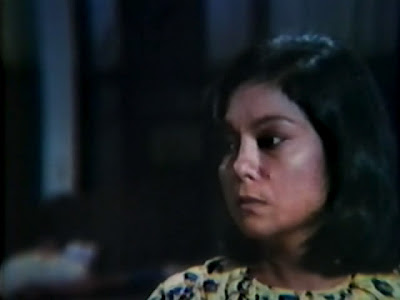Angela.
Widely considered as one of Nora Aunor's best films, it's just quite puzzling that Cinema One rarely shows it. Last night, they finally did (at around 11:30 pm). Lucky me, I was still awake and was able to catch it, and indeed, it was a truly powerful film.
Directed by the late great Mario O'Hara, "Bulaklak sa City Jail" is not your usual Filipino melodrama. Instead, it is a dramatic film that is more concerned about the suspense of its revelations rather than the shedding of tears. Based on a story by Lualhati Bautista, the film is a well-weaved, bare it all portrait of the lives of incarcerated women and how they were rendered cruel and more sexually desperate by time. One of them is new inmate Angela (Nora Aunor), a nightclub singer who was arrested because of attempted murder. With her frail personality and small body frame, she's not exactly the one you may visualize when you think of women prisoners.
Moral-wise, she is not the most perfect of characters, but there's something in her that speaks to your soul. Perhaps it is Aunor's eyes, or maybe it is her character's desire to escape and start anew. Whatever it is, Angela fascinates me not because of her purity as a woman but because of the complete opposite; I was drawn to her because of her numerous flaws. Such a character is tailor-made for Nora Aunor, and she has proven her understated power as an actress once more by portraying Angela not as someone who's shallowly righteous but as a woman (and pregnant at that) who just want to set things right. We sympathize with her not just because she is the main character but simply because she deserves it, and we pity her not merely as a movie character but as a tangible human being.
With films like "Tatlong Taong Walang Diyos", "Bakit Bughaw ang Langit?" and the more recent "Babae sa Breakwater", the great Mario O'Hara has repeatedly journeyed us through the corners of a woman's heart both in the context of love and society. But in "Bulaklak sa City Jail", motherhood has been the main focus. On one side, we have Luna (Celia Rodriguez), a woman who prostitutes herself inside the prison just so she can financially support her son. On the other, we have Viring (Perla Bautista), a woman who lost her sanity when her child was taken away from her. There's also Juliet (Gina Alajar), a young woman who desires escape so that she can be with her son again and also take revenge on those (specifically her husband and his lover) who took advantage of her incarceration.
In these scarred images of motherhood, we are given the temporal freedom in deciding which of them will ultimately mirror Angela's fate as a mother when she finally delivers her child. It's a question that subtly runs throughout the film, and in one of the most powerfully intense sequences in all of Philippine cinema, we see how Angela takes sanctuary inside a literal lion's den (in Manila Zoo, while being chased by policemen) where she has ironically delivered her child in peace. With that, O'Hara and Bautista seem to suggest something awfully pessimistic: that we have been too socially cruel for our own good that the only safe place to bring a child into this world is in the primitive presence of inept animals. Yes I know, that may have been too negative a cinematic statement, but that's not exactly invalid either.
Now plot-wise, the intensity of that particular sequence wouldn't have been that successful if not for the careful pacing (and a musical score that's reminiscent of "Psycho"). With a great narrative development that can only be attributed to delicate writing and directing, O'Hara has built and staged the film like a suspenseful novel. And although I do not like how the film has ended in much the same way I hated how "Hinugot sa Langit" was concluded, I do not necessarily disagree with it. Perhaps the film has brooded too much in its entirety that a happy ending seems out of place. But hell, Angela deserves it, and amid all the moral filth, it's a refreshing sight to behold.
FINAL RATING







